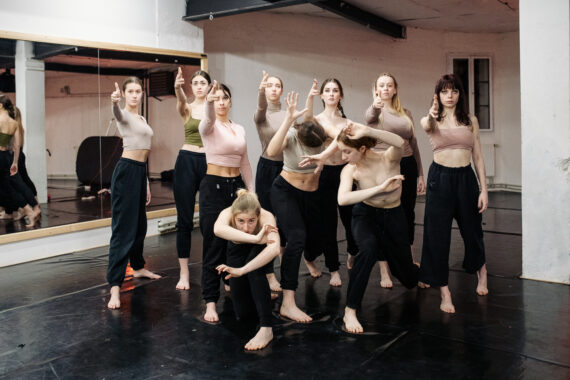Road 19
We are memory 2023
Memory of Nations Theatre
Genre: Dans, Jongerenvoorstelling
Geschikt voor: 10+, 12-18 jaar, Volwassenen
We Are Memory: Road 19 is a play directed by Tamara Pomoriški, Art Director of the Memory of Nations Theatre, which is produced annually in cooperation with Theater Na de Dam in the Netherlands. This year marks the fifth edition of the performance. Each edition has its own theme and unique environment. This year, it is the Romani Holocaust, which is interpreted through the artistic medium of dance and motion theatre.
The true stories of witnesses are told by 14 final-year students from the Prague Conservatoire, and their artistic medium is solely dance and the voice of the performer Ridina Ahmed. The artists decided to present the bitter subject of the Romani Holocaust in a gallery exhibition hall open to the public. Thus, the dancers themselves become exhibits, bidding viewers to give thought on their own perception of racism and the extent to which this issue is still current in society. The abstract sounds and environment do not distract the viewers’ attention, allowing them to consider whether they, too, might not be dividing society into “us” and “them”.
The script draws directly from the testimonies of historical witnesses. In previous years, young people welcomed the witnesses in Post Bellum’s offices. For this year, on 19 November the students headed outside of Prague for the first time. Their meetings were hosted by the Museum of Romani Culture in Brno and the Holocaust Memorial in Hodonín u Kunštátu. The students also explored the institutions’ exhibitions, which present this tragic aspect of our modern history. In Brno, the students met with Rudolf Murka (1959) and Antonín Lagryn (1947). Both of them are second-generation witnesses – their parents survived the concentration camps in Auschwitz and Ravensbrück. Mr Murka’s mother found asylum in Slovakia, which saved her from being deported. The memorial in Hodonín u Kunštátu commemorates the time when whole Romani families were interned there. Day-to-day operations of the camp were also observed by then-10-year-old František Němec (1932). Even 80 years later, he still has vivid memories of the humiliating arrival process, the inhuman work conditions, and the typhus epidemic that decimated the inhabitants of the camp, especially the children.
Credits:
Direction: Tamara Pomoriški
Choreography: Nela Štarková
Text: Ruth Františka Blažková and Adéla Maria Bidelnica
Dancers: Sára Musilová, Kateřina Bílková, Natálie Kreidlová, Nela Janů, Barbora Slováčková, Sára Langrová, Anna Petráňová, Adéla Maria Bidelnica, Maria Petryshynets, Tereza Železná, Hana Bažantová, Aneta Malinová, Andrea Stibůrková, Nela Štarková
Sound Design: Ridina Ahmed
Graphic Design: Tereza Tomešová, Matěj Pospíšil
Lights: Marek Střížovský
Phoyography: Barbora Mráčková
The performance is produced with the support of the Prague City Hall, the Czech Ministry of Culture, the Holocaust Victim Endowment Fund, the Dutch Embassy in Prague, and Theater Na de Dam in cooperation with GHMP Dům U Kamenného zvonu and the Museum of Romani Culture.
Deze voorstelling heeft eerder gespeeld op
| Datum | Stad | Locatie |
|---|---|---|
| 31 jan. 2023 | Prague | Dům U Kamenného zvonu, Old Town Square 605, Prague |
| 27 jan. 2023 | Prague | Dům U Kamenného zvonu, Old Town Square 605, Prague |
